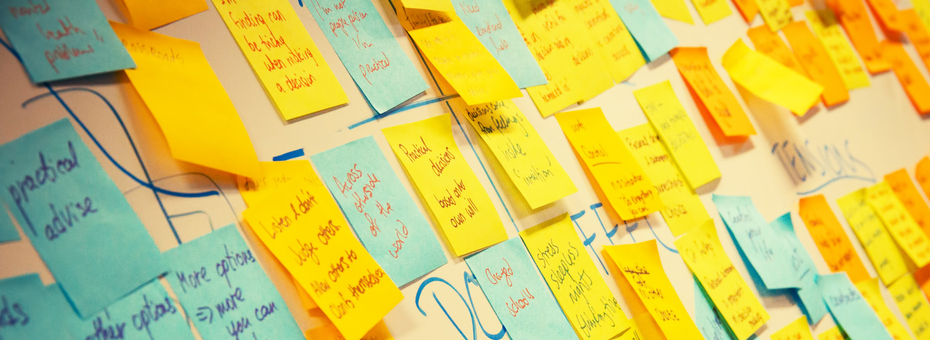Lean Coffee is a structured, but agendaless meeting which relies on participant discussion to create an agenda at the beginning. It has been praised for making meetings more productive by giving all participants a say in creating an agenda that works for everyone. LEI Senior Coach Josh Howell recently chose to incorporate Lean Coffee principles into the 2017 Lean Coaching Summit, which he organized and hosted back in July. Here’s how he did it:
So let’s start with some background. How did the Lean Coaching Summit come to be?
The Lean Coaching Summit was created around this concept of lean coaching, which at the time of inception and still today is developing as a recognized discipline within the broader scope of lean thinking and practice. And yet, in the literature available, there isn’t necessarily an agreed-upon definition of lean coaching.
So there‘s this question we’ve been exploring: “What is lean coaching and what, if anything, makes it different from other forms of coaching?” In the coaching world you have pretty established disciplines, like sports coaching or executive coaching, plus the models they use. And it wasn’t clear if any of those models encompassed what we may think of as lean coaching. So our purpose was to bring together people who identify as lean coaches to explore the question of what lean coaching is, and in doing so, maybe advance our understanding to something more codified and easily teachable.
Do you feel like you made some progress toward addressing those purposes?
I believe we actually did this year. We did a few things differently with this summit, but the primary modification was on the traditional conference opening when everyone sits down for an opening keynote. Instead, we shepherded everyone into a ballroom immediately after the welcome and housekeeping announcements, and we organized them into 20 tables of roughly 10 people each to conduct 20 Lean Coffees (LCs). Specifically, the guiding question we posed was “As a practicing or prospective lean coach, what’s on your mind? What would you like to spend time exploring over the next two days?” Everyone had about an hour to share and discuss their thoughts, both as individuals and collectively as a group.
What purpose did the LC serve?
Based on the feedback we got, the attendees seemed to appreciate this as an opportunity to prepare for the summit itself. So you know, when you go to a summit you’re working up until the last day, and you’re probably still working as you travel and check into your hotel. Then you wake up in the morning and you’ve got more emails…and then suddenly it’s time for the summit, and you’re shocked into the moment. And that’s assuming you’re not still sending emails.
The consequence of all that is that people often arrive at summits unprepared, with no chance to transition themselves physically or mentally into learning mode. Thus whatever you get out of the summit is just going to happen to you – it’ll be less intentional than it could be. So just to have the attendees ask themselves, “What do I want to learn at this summit?” I think the LC provided people with a way to get prepared.
Did including LC yield any benefits for you and/or the presenters?
Definitely. The second thing it did was it gave both me as the organizer, plus all the other presenters, an opportunity to hear what’s on people’s minds, and get to know them from the start. It sounds like a simple thing but if you think about past summits you’ve been to, you’ll probably recall that it’s not till the end of the conference that you get that feel for who you’re spending time with. In the very beginning, it’s always just you and a bunch of strangers. By having a LC at the very beginning you force yourself to get to know at least nine other people right away. So pretty quickly speakers and audience members started networking. And that helped us address the second purpose of the summit, which was progressing knowledge in the field of lean coaching.
We also had another LC at the end of the summit. For that we asked everyone to think about next steps. Not just what do you want to do, but what can we do to help you between this conference and the next one? I think that was a good way to encourage people to continue their learning all year long.
How can people use these same principles in their 1:1 coaching?
I would think about that less literally. You might not implement LC directly into a coaching action. However, there are certain principles behind LC such as:
- Just-in-Time identification of challenges
- Making them visible to both coach and coachee
- Prioritizing which of those problems should be addressed first
- Engaging in open and honest candid discussions about those problems – not necessarily to solve it, but to just engage in deeper, more critical thinking about it so that a better next step can be identified and taken.
It’s those principles of the LC process that engaged our attendees and which I think are also very applicable to effective coaching.
Put it this way. A coach calls a client and schedules a future coaching meeting about a specific challenge. And then time passes. You show up for the appointment and you stick to the agreed-upon plan.
But meanwhile, life has happened. The situation has changed. The need that was really prominent at the time of scheduling the interaction is less important. Maybe it’s resolved itself, maybe it’s changed in some fundamental way, maybe the people who were involved in it has changed and it’s thrown everything into a state of disarray. So the coach will show up feeling well-prepared, since they’ve had however long to prepare for the situation.
And yet the coachee could care less about that issue because this morning they got an email that, say, they’ve just lost their biggest customer. A LC just before the interaction could set a better stage. So in my mind, the principles of LC apply very well to a successful coaching interaction.






